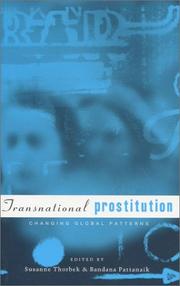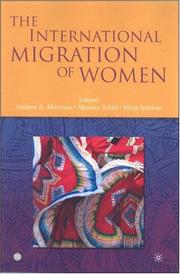| Listing 1 - 10 of 48 | << page >> |
Sort by
|
Book
ISBN: 9780813386171 0813386179 Year: 1993 Publisher: Colorado: Westview press,
Abstract | Keywords | Export | Availability | Bookmark
 Loading...
Loading...Choose an application
- Reference Manager
- EndNote
- RefWorks (Direct export to RefWorks)
Book
ISBN: 0855323914 2825405612 Year: 1978 Publisher: London Search Press
Abstract | Keywords | Export | Availability | Bookmark
 Loading...
Loading...Choose an application
- Reference Manager
- EndNote
- RefWorks (Direct export to RefWorks)
Migration. Refugees --- Women --- Migrant labor --- Women alien labor --- Migration, Internal --- Femmes --- Travailleurs migrants --- Migration intérieure --- Employment --- Travail --- Women foreign workers --- Migration intérieure

ISBN: 1842770314 9781842770313 Year: 2002 Publisher: London Zed Books
Abstract | Keywords | Export | Availability | Bookmark
 Loading...
Loading...Choose an application
- Reference Manager
- EndNote
- RefWorks (Direct export to RefWorks)
Prostitution. --- Women alien labor. --- Sex tourism. --- Women foreign workers. --- Law --- Sociology of work --- Demography --- Sociology of the family. Sociology of sexuality --- Denmark --- Netherlands --- Canada --- Sweden --- Germany --- Thailand --- Spain --- Australia --- Men --- Migration --- Sex work --- Attitudes --- Sex industry --- Legislation --- Book
Book
ISBN: 0253021014 9780253021014 9780253020888 0253020883 9780253020932 025302093X Year: 2015 Publisher: Washington, District of Columbia ; Bloomington, Indiana : Woodrow Wilson Center Press : Indiana University Press,
Abstract | Keywords | Export | Availability | Bookmark
 Loading...
Loading...Choose an application
- Reference Manager
- EndNote
- RefWorks (Direct export to RefWorks)
Keough puts scholarship on gender and migration into dialogue with postsocialist studies and offers a critical assessment of international anti-trafficking efforts.
Women foreign workers --- Foreign women workers --- Women alien labor --- Migrant women labor (Foreign workers) --- Migrant women workers (Foreign workers) --- Women migrant labor (Foreign workers) --- Women migrant workers (Foreign workers) --- Foreign workers --- Women employees --- Moldova --- Economic conditions
Book
ISBN: 0253069173 9780253209048 Year: 1994 Publisher: Bloomington : Indiana University Press,
Abstract | Keywords | Export | Availability | Bookmark
 Loading...
Loading...Choose an application
- Reference Manager
- EndNote
- RefWorks (Direct export to RefWorks)
Women foreign workers --- Women immigrants --- History. --- Immigrant women --- Immigrants --- Foreign women workers --- Women alien labor --- Migrant women labor (Foreign workers) --- Migrant women workers (Foreign workers) --- Women migrant labor (Foreign workers) --- Women migrant workers (Foreign workers) --- Foreign workers --- Women employees
Book
ISBN: 9282571882 Year: 1987 Volume: vol *444
Abstract | Keywords | Export | Availability | Bookmark
 Loading...
Loading...Choose an application
- Reference Manager
- EndNote
- RefWorks (Direct export to RefWorks)
Occupational training for women --- Women alien labor --- Formation professionnelle des femmes --- Travailleuses étrangères --- Foreign women workers --- Migrant women labor (Foreign workers) --- Migrant women workers (Foreign workers) --- Women migrant labor (Foreign workers) --- Women migrant workers (Foreign workers) --- Foreign workers --- Women employees --- Women --- Employment --- Women foreign workers. --- Travailleuses étrangères --- Women foreign workers --- European communities --- Vocational guidance for women
Book
ISBN: 2747579751 233628362X 2940503907 2296390056 9782747579759 Year: 2005 Volume: 5 Publisher: Graduate Institute Publications
Abstract | Keywords | Export | Availability | Bookmark
 Loading...
Loading...Choose an application
- Reference Manager
- EndNote
- RefWorks (Direct export to RefWorks)
Le nouvel ordre économique néolibéral modifie la division internationale du travail, ce qui entraîne un accroissement des populations migrantes de travailleurs et de travailleuses. Actuellement, une personne sur dix dans les régions développées est migrante, et les femmes représentent la moitié de ce nombre. Longtemps, pourtant, la figure du migrant a été représentée comme masculine, en raison des représentations stéréotypées ou erronées du rôle et de la place des femmes et des hommes dans les sociétés, et les recherches ou programmes relatifs aux migrants ont ignoré la composante féminine des migrations. Or, les femmes migrent bien, elles aussi. Une grande partie des femmes migrantes – même qualifiées – travaillent dans le secteur des soins ou des emplois domestiques. Le transfert international des soins et de l’attention aux autres (care) – sorte de nouvelle matière première extraite des pays du Sud pour être consommée dans les pays riches – est un nouvel échange inégal. Les espaces où se réalise le travail des migrantes restent souvent invisibles, lieus de peu de droits. Si les discriminations et les abus sont à dénoncer, l’image de victime accolée aux migrantes et cependant loin de convenir. La trajectoire migratoire demande pugnacité et courage. Et nous pouvons nous demander s’il ne s’agit pas du départ des personnes les plus combatives de la société… Les identités se transforment dans l’expérience de la migration : comme le dit l’une d’elles, « je ne suis plus celle que j’ai laissée derrière moi ». Des réseaux transnationaux se construisent, accompagnés d’une circulation d’idées, de nouvelles représentations, de projets, de flux financiers. En 2002, les revenus du travail des migrants atteignaient 73 milliards de dollars, un montant plus élevé que celui de l’aide internationale au développement. Un nouvel ordre colonial s’instaure avec la nouvelle division internationale du travail. Mais les migrations des femmes et des hommes à travers les pratiques sociales…
International division of labor --- Emigration and immigration --- Women immigrants --- Division internationale du travail --- Emigration et immigration --- Immigrantes --- Women alien labor. --- International division of labor. --- Globalization --- Emigrant remittances --- Social conditions. --- Social aspects. --- Women immigrants - Social conditions. --- Globalization - Social aspects. --- Emigrant remittances - Developing countries. --- droits humains --- relations sexuelles --- féminisme --- division sexuelle du travail --- commerce international --- femmes --- développement économique --- relations hommes-femmes --- commerce équitable
Book
ISBN: 0252094824 9780252094828 025203757X 0252079116 1299700810 9781299700819 9780252037573 9780252079115 Year: 2013 Publisher: Urbana
Abstract | Keywords | Export | Availability | Bookmark
 Loading...
Loading...Choose an application
- Reference Manager
- EndNote
- RefWorks (Direct export to RefWorks)
In examining the complex dynamics of how immigrant women navigate political and economic uncertainties, this collection highlights the important role of citizenship status in defining immigrant women's opportunities, wages, and labour conditions.
Women foreign workers --- Foreign women workers --- Women alien labor --- Migrant women labor (Foreign workers) --- Migrant women workers (Foreign workers) --- Women migrant labor (Foreign workers) --- Women migrant workers (Foreign workers) --- Women immigrants --- Women immigrants. --- Women foreign workers. --- Economic conditions. --- Foreign workers --- Women employees --- Immigrant women --- Immigrants --- Economic conditions --- E-books

ISBN: 1281113220 9786611113223 0821372289 0821372270 Year: 2007 Publisher: Washington, DC : World Bank,
Abstract | Keywords | Export | Availability | Bookmark
 Loading...
Loading...Choose an application
- Reference Manager
- EndNote
- RefWorks (Direct export to RefWorks)
The current share of women in the world's international migrant population is close to one half. Despite the great number of female migrants and their importance for the development agenda in countries of origin, there has until recently been a striking lack of gender analysis in the economic literature on international migration and development. This volume makes a valuable contribution in this context by providing eight new studies focusing on the nexus between gender, international migration, and economic development.
Women immigrants. --- Women foreign workers. --- Women --- Emigration and immigration --- Brain drain. --- Economic conditions. --- Economic aspects. --- Foreign women workers --- Women alien labor --- Migrant women labor (Foreign workers) --- Migrant women workers (Foreign workers) --- Women migrant labor (Foreign workers) --- Women migrant workers (Foreign workers) --- Immigrant women --- Foreign workers --- Women employees --- Immigrants
Book
ISBN: 9781501709418 1501709410 9781501712050 1501712055 9781501713149 1501713140 1501713159 Year: 2017 Publisher: Ithaca : Cornell University Press,
Abstract | Keywords | Export | Availability | Bookmark
 Loading...
Loading...Choose an application
- Reference Manager
- EndNote
- RefWorks (Direct export to RefWorks)
"Sex, Love, and Migration goes beyond a common narrative of women's exploitation as a feature of migration in the early twenty-first century, a story that features young women from poor countries who cross borders to work in low paid and often intimate labor. Alexia Bloch argues that the mobility of women is marked not only by risks but also by personal and social transformation as migration fundamentally reshapes women's emotional worlds and aspirations. Bloch documents how, as women have crossed borders between the former Soviet Union and Turkey since the early 1990s, they have forged new forms of intimacy in their households in Moldova, Ukraine, Belarus, and Russia, but also in Istanbul, where they often work for years on end. Sex, Love, and Migration takes as its subject the lives of post-Soviet migrant women employed in three distinct spheres--sex work, the garment trade, and domestic work. Bloch challenges us to decouple images of women on the move from simple assumptions about danger, victimization, and trafficking. She redirects our attention to the aspirations and lives of women who, despite myriad impediments, move between global capitalist centers and their home communities"--
Post-communism --- Transnationalism --- Women foreign workers --- Foreign women workers --- Women alien labor --- Migrant women labor (Foreign workers) --- Migrant women workers (Foreign workers) --- Women migrant labor (Foreign workers) --- Women migrant workers (Foreign workers) --- Foreign workers --- Women employees --- Trans-nationalism --- Transnational migration --- International relations
| Listing 1 - 10 of 48 | << page >> |
Sort by
|

 Search
Search Feedback
Feedback About UniCat
About UniCat  Help
Help News
News